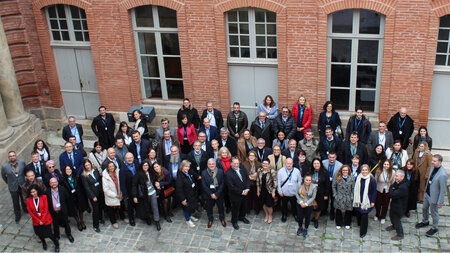An Interactive Guide for Using Digital Feedback in Teaching
The Junior Professorship TESOL / Advanced Academic English has launched the "Digital Feedback Map", an online platform that introduces a variety of digital feedback methods and provides practical tips for their use in learning and teaching
The "Digital Feedback Map" (DFM) is the central product of the project "Pedagogical Guidance for Using Digital Feedback" and was created by the Junior Professorship TESOL / Advanced Academic English (Head: Jun.-Prof. Dr. Jennifer Schluer) at Chemnitz University of Technology. It is now freely available online at https://tinyurl.com/DigitalFeedbackOverview.
As an online platform, it presents a variety of digital feedback methods and provides practical advice for their pedagogical use. Teachers and students can consult it to learn more about different digital feedback methods, compare them and select the most suitable ones for their unique educational contexts. "The aim is to develop digital feedback literacies on the part of teachers and learners, to enable interactive feedback dialogues and thus contribute to the improvement of learning processes and learning outcomes," Schluer explains. Numerous handouts, task manuals and video tutorials can be retrieved free of charge.
The DFM currently offers an overview of the following 19 digital feedback methods: Text-Editor Feedback, Survey Feedback, Blog Feedback, Forum Feedback, E-Portfolio Feedback, Audio Feedback, Talking-Head Video Feedback, Email Feedback, Screencast Feedback, Cloud-Editor Feedback, Wiki Feedback, Chat Feedback, Digital Board Feedback, Social Media Feedback, Automated Writing Evaluation (AWE), Live Poll Feedback (ARS), Chatbot Feedback, Videoconference Feedback and Robot-Assisted Feedback. "Given the ongoing technological developments and the emergence of new digital methods, we plan to update the Digital Feedback Map continuously," Schluer says.
The 19 digital feedback methods can be openly explored via the "General Overview" page or selectively through different filters: feedback direction (self-feedback, teacher-to-learner, peer feedback, learner-to-teacher), feedback mode (one mode, two modes, three modes), feedback timing (synchronous, asynchronous, synchronous/asynchronous) and assessment criteria (local feedback, global feedback, local/global feedback). "This classification allows users to easily compare different digital feedback methods, select the most suitable ones and align them with specific learning environments and teaching objectives," the junior professor explains.
For each digital feedback method, the DFM offers a comprehensive overview with definitions, discussions of advantages and disadvantages, software recommendations and key references, suggestions for potential areas of application as well as handouts in English and German. "We also offer recommendations for combining different digital feedback methods in order to build on the strengths of the individual methods and reduce their weaknesses," Schluer elaborates. For a direct implementation in the classroom, the pages called "Contexts of Use" are particularly noteworthy. They not only contain suitable learning objectives, learner groups, subjects/disciplines, teaching settings and assignment types, but also numerous sample tasks and video tutorials.
Short introductory videos on the "Digital Feedback Map" (https://youtu.be/umwf6sRTnT8) and the project (https://youtu.be/cUhqS9zuUuQ) can be accessed in English and German at the links provided.
The "Digital Feedback Map" was created as part of the project "Pedagogical Guidance for Using Digital Feedback: Digital Feedback Map (DFM)" and was financially supported by the Foundation for Innovation in Higher Education (Stiftung Innovation in der Hochschullehre).
DFM project website: https://www.tu-chemnitz.de/phil/english/sections/tesol/dfm.php
For further information, please contact Junior Professor Dr. Jennifer Schluer, Institute of English/American Studies, phone +49 (0)371 531-34205, e-mail jennifer.schluer@phil.tu-chemnitz.de
Mario Steinebach
08.12.2023






